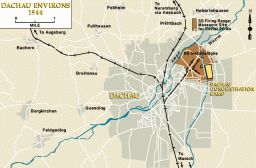You searched for: Liberation
<< Previous | Displaying results 1241-1250 of 1269 for "Liberation" | Next >>
-
Charlene Schiff describes difficulties in gaining entry to the United States in the aftermath of the Holocaust
Oral HistoryBoth of Charlene's parents were local Jewish community leaders, and the family was active in community life. Charlene's father was a professor of philosophy at the State University of Lvov. World War II began with the German invasion of Poland on September 1, 1939. Charlene's town was in the part of eastern Poland occupied by the Soviet Union under the German-Soviet Pact of August 1939. Under the Soviet occupation, the family remained in its home and Charlene's father continued to teach. The Germans…
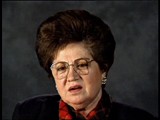
-
Brigitte Friedmann Altman describes a roundup of children in the Kovno ghetto in March 1944
Oral HistoryWorld War II began in September 1939. Brigitte and her family moved to Kovno, hoping to secure visas and passports for travel to North America. In July 1941, Brigitte and her family were forced to move into the Kovno ghetto after the Germans occupied Lithuania. Brigitte's family survived the "Great Action," but her mother died of illness in the ghetto. After a roundup targeting children in March 1944, Brigitte escaped from the ghetto with the help of a former employee of her father. Soviet forces liberated…
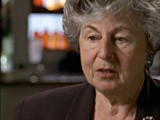
-
Suse Gruenbaum Schwarz describes preparation for and hiding during a Nazi raid
Oral HistorySuse's family moved to the Netherlands in 1933. After invading the Netherlands in 1940, the Germans imposed anti-Jewish measures. From 1942, Suse could not attend school. The family went into hiding in 1943, Suse and her mother on one farm and her father on another. Later, her father and another couple came to hide with Suse. They were liberated in 1945. Suse arrived in the United States in 1947.
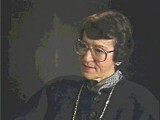
-
Leon Bass describes his movements during the Battle of the Bulge
Oral HistoryLeon Bass was born in Philadelphia, PA in 1925. He joined the US Army in 1943 and served as a member of the all-Black 183rd Engineer Combat Battalion attached to General Patton's Third Army. Leon's unit was involved in the Battle of the Bulge as well as the liberation of Buchenwald. After the war, Leon went on to receive his doctorate, teach, and speak about the Holocaust and racism. In this interview, Leon discusses his unit's movements during the Battle of the Bulge. He describes their path from…
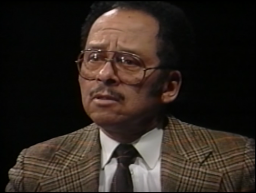
-
Irene Hizme and Rene Slotkin describe being separated from their mother upon arrival in the Auschwitz camp
Oral HistoryIrene and Rene were born Renate and Rene Guttmann. The family moved to Prague shortly after the twins' birth, where they were living when the Germans occupied Bohemia and Moravia in March 1939. A few months later, uniformed Germans arrested their father. Decades later, Irene and Rene learned that he was killed at the Auschwitz camp in December 1941. Irene, Rene, and their mother were deported to the Theresienstadt ghetto, and later to the Auschwitz camp. At Auschwitz, the twins were separated and subjected…
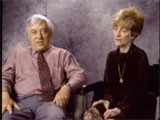
-
Wilek (William) Loew describes forced labor in Lvov
Oral HistoryWilek was the son of Jewish parents living in the southeastern Polish town of Lvov. His family owned and operated a winery that had been in family hands since 1870. Wilek's father died of a heart attack in 1929. Wilek entered secondary school in 1939. Soon after he began school, World War II began with the German invasion of Poland. Lvov was in the part of eastern Poland annexed by the Soviet Union. Although the Soviets took over Wilek's home and the family business, Wilek was able to continue his…
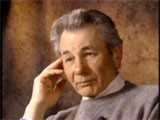
-
Wilek (William) Loew describes refugees from western Poland after their arrival in Soviet-occupied Lvov
Oral HistoryWilek was the son of Jewish parents living in the southeastern Polish town of Lvov. His family owned and operated a winery that had been in family hands since 1870. Wilek's father died of a heart attack in 1929. Wilek entered secondary school in 1939. Soon after he began school, World War II began with the German invasion of Poland. Lvov was in the part of eastern Poland annexed by the Soviet Union. Although the Soviets took over Wilek's home and the family business, Wilek was able to continue his…
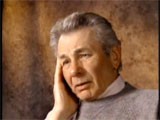
-
Wilek (William) Loew describes the Soviet occupation of Lvov in 1939
Oral HistoryWilek was the son of Jewish parents living in the southeastern Polish town of Lvov. His family owned and operated a winery that had been in family hands since 1870. Wilek's father died of a heart attack in 1929. Wilek entered secondary school in 1939. Soon after he began school, World War II began with the German invasion of Poland. Lvov was in the part of eastern Poland annexed by the Soviet Union. Although the Soviets took over Wilek's home and the family business, Wilek was able to continue his…
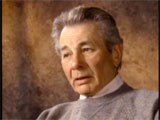
-
The Lodz Ghetto
Animated MapView an animated map of key events in the history of the Lodz ghetto in occupied Poland, from establishment by the Germans in 1940 until destruction in 1944.
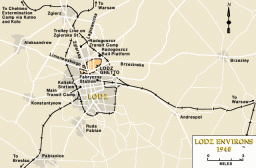
-
Dachau concentration camp
Animated MapView an animated map showing key events in the history of the Dachau concentration camp, which was established by the Nazi regime in 1933.
